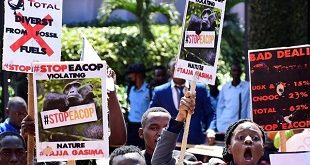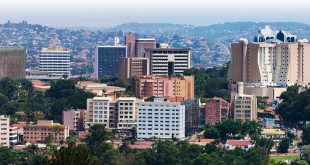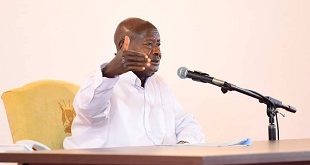
By Haggai Matsiko
Critics suspect Museveni is building 2016 war chest
New Finance Minister, Matia Kasaija’s request for a Shs847 billion supplementary budget is coming under major scrutiny in parliament. Apart from being seen as a potential source for President Yoweri Museveni’s 2016 campaign cash, its sheer size and what it is to be spent on, has raised concerns. Of the money, only Shs11.9 billion is for development expenditure and a whopping Shs728.1 billion for recurrent expenditure.
While the request details which sectors are taking what and for what, observers are pointing to the fact that most of the requests are for departments and institutions, whose cash President Museveni directly controls.

With the 2016 election clock ticking, anger over government spending-spree is building up even outside parliament.
“That supplementary budget is poorly disguised,” says Joseph Bossa, the vice president of the opposition Uganda Peoples Congress (UPC), “It is a flush fund to finance Museveni and the NRM elections.”
Erias Lukwago, the embattled Kampala Mayor shares in this view. Lukwago told The Independent that because the ruling party, National Resistance Movement (NRM) and its chairman, President Yoweri Museveni are not in the habit of mobilising funds from supporters, they have earned a reputation for raiding public resources to run their activities.
“With that reputation,” Lukwago added, “it was always foreseeable that around this time, President Museveni would once again use such avenues to fund the upcoming elections.”
Bossa and Lukwago’s views are shared by many of President Museveni’s critics and largely informed by what has happened in the past.
Bossa points at especially State House, which in this round is getting Shs 16 billion. Lukwago also thinks the Shs7 billion presented as partial payment to USAFI market under KCCA is also a disguise.
Other critics point to the Shs 2.5 billion that will be spent on facilitating Resident District Commissioners (RDC) and their deputies to monitor government projects and the Shs6.5 billion on facilitating Internal Security Organisation (ISO) operations. “All these are just conduits,” Lukwago said.
There is also the Defence Ministry, whose potion at Shs 62 billion is this time the biggest. Of this, Shs20 billion is clearly marked as classified. Classified expenditure, while meant for military procurements and operations, tends to get diverted.
Just weeks before putting the request for the supplementary, Defence officials were negotiating behind closed doors with legislators to get approval for a loan of Shs 470 billion for military procurements. The legislators did not give a nod. Now, with President Museveni directly involved, this money must be found.
Defense enthusiasts claim that because Uganda is already involved in the South Sudan war, among others, the country must meet the cost of that operation.
Kenneth Mugambe, the Director of Budget at the Finance Ministry, told The Independent that part of the money this time is meant to repay borrowed monies.
“There is nothing illegal about a supplementary budget,” Mugambe says, “the law provides for it. And if you look at the current supplementary budget, some of it is statutory expenditure. It is to be used to repay public debt. We have tabled it before parliament for noting. Parliament does not approve statutory expenditure”.
Parliamentary jittery
But Ntenjeru North MP Amos Lugoloobi, who chairs the Parliamentary Committee on the Budget, told The Independent that “the whole parliament is jittery about these supplementary budgets”.
“This is one of the biggest in the history of supplementary budgets. And when you look at some of the things for which money is being requested, these are not things that should not have been foreseen. Supplementary budgets should be catering for unforeseen conditions.”
Lugoloobi points out examples of payment for gratuity and pension and maintaining a buffer stock for cotton, which he says should have been foreseen and should be guided by clear policies.
“We have explained these things,” Mugambe says, “as you know we have undertaken some reforms and in the process have discovered we had not paid gratuity, pensions. The buffer stock for cotton is equally important.”
Economist Fred Muhumuza, a former advisor to the Minister of Finance, is unimpressed. He summarises the government’s behavior as “fiscal indiscipline”.
“You have a situation where the government is in the habit of spending what the economy does not generate,” Muhumuza says, “that is why it has to borrow all the time.”
Prof. Augustus Nuwagaba who has been the most vocal voice against supplementary budgets since 2010 says the government must adopt a zero-based budgeting process instead of upfront or traditional budgeting approach.
Zero-based budgeting requires that all budget items are re-evaluated thoroughly, starting from the zero-base, under traditional budgeting, however, line ministries, departments and agencies (MDAs) justify only increases over the previous year’s budget and what has been already spent is automatically approved, economists say.
This according to Nuwagaba encourages misuse of budget funds because MDAs keep getting allocations irrespective of whether they have completed utilising the funds that they were allocated in the previous years.
Year on year, President Museveni’s government has been tabling more and bigger supplementary budgets. Supplementary budgets have been increasing from 4% in 2008/2009, to 7.2% in 2009/2010 and over 30% in 2010/11. Kasaija’s predecessor Maria Kiwanuka did not have to deal with all these concerns—there was no election to finance between 2011 and 2015 when she served. But for Syda Bbumba, who served before her, the story was different.
In a space of just months, Bbumba delivered supplementary budgets of close to a trillion shillings—with the last round coming in December 2011 right in the middle of campaigns. Even the International Monetary Fund (IMF) had a major fall out with President Museveni over a supplementary budget. What many find more disturbing are the supplementary budgets requested towards elections.
Towards the 2011 elections, President Museveni got parliament to approve a supplementary of Shs 600 billion and another of Shs 380 billion. President Museveni had got Central Bank Governor Tumusiime Mutebile to draw from the reserves a staggering Shs1.7 trillion for acquisition of six Russian-made jets and their accompaniments. It later emerged the six jets cost Shs108billion each or Shs 654 billion in total. This leaves a balance of 1.1trillion. While half of these funds might have been spent on the other weapons that were purchased together with the jets, a sizable portion of this “not completely transparent” expenditure, as Mutebile called it recently, is said to have found its way in the campaigns and the results were dire. Uganda’s inflation jumped to about 30 percent.
 The Independent Uganda: You get the Truth we Pay the Price
The Independent Uganda: You get the Truth we Pay the Price


